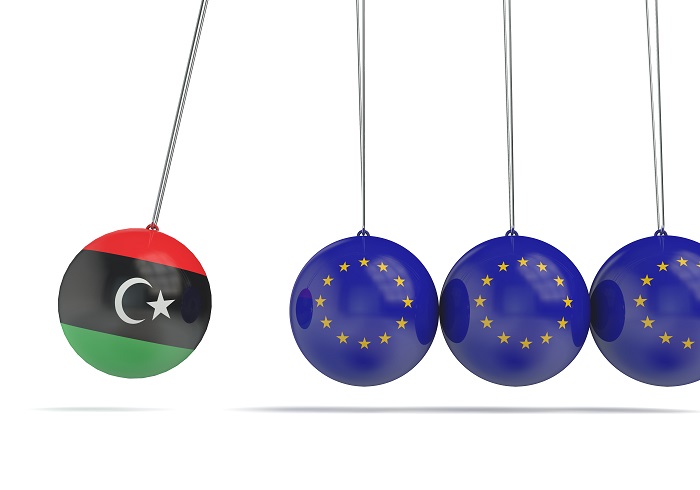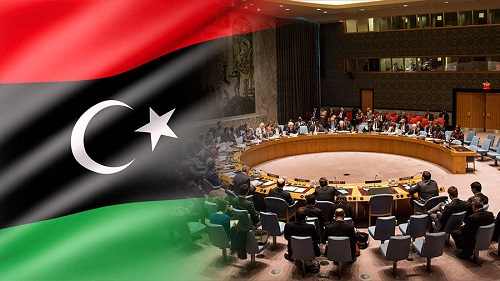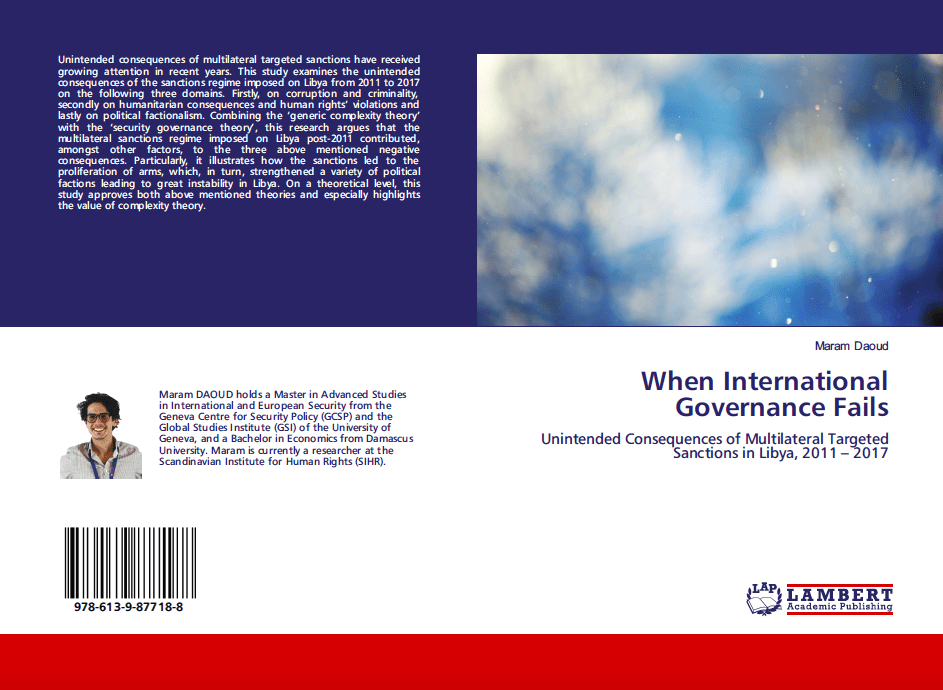To study sanctions in Libya, first we should examine the unintended consequences that were generated by the targeted sanctions regime on Libya from 2011 until 2017. Three negative consequences of multilateral sanctions were analyzed through testing the following three hypotheses:
- a) sanctions lead to an increase of corruption and criminality
- b) sanctions have negative humanitarian consequences and increase human rights violations
- c) sanctions strengthen political factions and lead to instability.
Targeted sanctions are part of international and regional policy instruments that cannot be isolated from one another, making them a significant area within Cross-Border & International Law. In a complex world order, targeted sanctions will most of the time not generate the intended outcomes nor will they reach their declared objectives without side-effects. Sanctions regimes interact with other policies generating unintended consequences that can be harmful.
Also, the elements of the sanctions regime itself work in a multidimensional way generating unintended consequences. In a complex international order, the outcomes are not generated in a simple linear relationship of cause and effect. It is a complex system that works in a multidimensional and complex way.
Threats to international peace and security have changed since the period of the cold war, and traditional policy instruments have become more complex. Additionally, nowadays, more actors are involved in security governance each representing their own interests.
CAATSA Sanctions: Definition, the list and cases
Therefore, targeted sanctions are complex instruments of security governance, which are implemented in a spectrum with other policies such as military intervention and the threat of use of force.
Trade Sanctions in Libya
According to United Kingdom’s government, the United Kingdom & other EU countries have active sanctions / embargos against Libya. If you are dealing with a sensitive market.

Arms embargo against Libya bans the export of ‘arms and related material’ – e.g., military ammunition, weapons & goods. You can view the full list of controlled goods and establish if your products fall within these regulations here.
Some otherwise uncontrolled goods are at risk of being used as parts for, or to manufacture military equipment in an embargoed country, even though they do not appear on the UK Military List and export may be banned/restricted. It is possible that air compressors could be deemed as “dual use” or have military end use.
Consequences of Multilateral Sanctions on Libya
In Libya, not only multilateral sanctions were implemented, but certain states also imposed unilateral ones. These states have also interpreted the multilateral sanctions regime differently. While the African Union relied on mediation to tackle Qaddafi’s regime violence against protesters, most of the European and Arab countries, as well as the United States, resorted to the use of force in addition to the implementation of sanctions on Libyan individuals and institutions.
The objectives of the different policies were to refrain the Qaddafi-Regime from the use of force and to force the Libyan authorities to protect civilians. However, the interactions of the various actors in the implementation of the sanctions regime have led to unintended consequences which, to some extent, complexified the situation in Libya.
With regard to the first hypothesis, the analysis has illustrated that sanctions can lead to corruption and criminality due to the tendency of the target’s tendency to engage in organized crime such as illicit trade of weapons and humans.
The sanctioned target will tend to compensate for its negative reputation by promoting a rally-round the flag tactic. In Libya, many of the actors including the Qaddafi-Regime busted the arms embargo to secure themselves and to generate funds. A network of smugglers emerged in Libya for trade in drugs, weapons, people, and commodities depending in line with tribal relations.
Concerning the second hypothesis, this study has clarified how asset freeze on some entities might generate severe humanitarian consequences and human right’s violations. Due to the sanctioning of vital entities such as the Central Bank of Libya, the Libyan dinar has been devaluated by approximately 50%. Also, sanctions on the Libyan National Oil Corporation have led to a rise of unemployment. Furthermore, asset freeze might coerce the target to comply with global norms but, most of the time, it will generate unintended consequences that could have an impact on ordinary people.
Lastly, this work showed how a sanctions regime might strengthen political factions as a result of a political and institutional vacuum. The Libyan militias who took control on some areas showed reluctance to be unified or to be integrated within the formal institutions. Consequently, tensions emerged among them leading Libya into a civil war.
The loyalists of Qaddafi, especially the ones who were in high ranked positions, would not accept to be easily sanctioned and referred to persecution. They emerged again as a rival power, driving the country into a civil war with three different governments.
Sanctions in Libya 2011: United Nations
On 26 February 2011, acting under Chapter VII of the Charter of the United Nations, the United Nations Security Council adopted Resolution 1970 (2011) imposing sanctions against Libya in response to the situation in the Libyan Arab Jamahiriya involving violence and the use of force against civilians.

National Oil Corporation Sanctions in Libya
While Libya’s fuel smuggling networks remain intact, they have seen a slump in activity due to lower global oil prices and the Covid-19 pandemic, according to the UN.
The panel of experts monitoring sanctions against Libya said in the report said it expects an increase in activity when global demand for oil products increases.
Global demand for marine fuels in 2020 experienced a sharp decline owing to the impact on world trade of the Covid-19 pandemic.
The ready availability of bunker fuel means market prices have remained low, including in the bunkering areas near Libya and Malta.
The current average price of marine gas oil (0.1 per cent Sulphur) in Malta is $453 a metric tonne, compared with $655 in December 2019.
This sharp decline of crude oil and bunker fuel prices has also increased the demand for tankers as floating storage units.
The floating storage capacity for refined products peaked in mid-May 2020, and demand for tankers continues to be high.
The reduction in demand for bunker fuels, high fuel availability, lower bunker prices and the low availability of product tankers have had a negative impact on the parallel market of refined products, principally marine gas oil (0.1% Sulphur), illicitly exported from Libya by sea.
Fuel diversion by sea has therefore been almost nil, and no tankers have been added to the sanctions list.
Final Remarks about Multilateral Sanctions in Libya
Despite the multiple negative unintended consequences that are generated by targeted sanctions, this paper does not intend to undermine the legitimacy of this policy instrument. On the contrary, in a world where security challenges are on the rise and where the use of force becomes more and more complicated, policy instruments such as targeted sanctions are highly relevant.
However, targeted sanctions do not represent a solution to every kind of security threat. They need to be developed with utmost vigilance and sensitivity to the unintended consequences they might generate. Further studies on different types of unintended consequences of targeted sanctions represent one of the many steps that shall be taken in order to alleviate their harmful effects.
LegaMart is a global legal platform designed to connect individuals, startups, and businesses with qualified lawyers across jurisdictions. With a mission to simplify cross-border legal services, LegaMart provides users with access to a diverse network of vetted legal professionals who specialize in areas such as international law, corporate law, immigration, dispute resolution, and more.
By leveraging technology and user-friendly tools, LegaMart allows clients to search for lawyers by country, language, or legal expertise, submit their legal queries, and receive tailored legal solutions in a streamlined, efficient manner. The platform serves as a bridge between legal professionals and clients who need multilingual, multi-jurisdictional support — especially in today’s increasingly globalized legal landscape.
Whether you’re an entrepreneur launching a business abroad, an individual dealing with immigration paperwork, or a company navigating cross-border compliance, LegaMart aims to make legal help more accessible, transparent, and collaborative.




